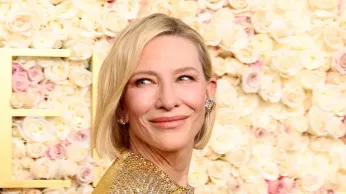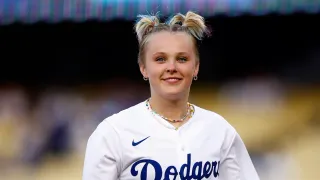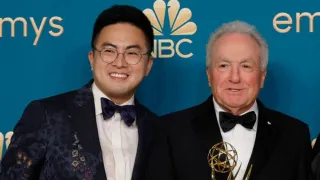
9 hours ago
Cate Blanchett Backs Trans Director Nate Gualtieri’s “Queerbait” at CinePride Festival
READ TIME: 3 MIN.
Hollywood’s ongoing evolution toward inclusive storytelling reached a new milestone this week as the inaugural CinePride Film Festival opened in Los Angeles, spotlighting queer creators and stories that have long struggled for visibility in mainstream cinema. Among the festival’s most talked-about works is “Queerbait,” an erotic short film written and directed by out trans filmmaker Nate Gualtieri, with the high-profile backing of executive producer Cate Blanchett—a move making headlines across the entertainment industry for its significance and symbolism .
“Queerbait” delivers a fresh twist on the classic professor-student dynamic. The film stars Sydney Mae Diaz as a trans student who has recently undergone top surgery, finding himself drawn into the orbit of his classics professor, played by Matthew Floyd Miller. As the two characters find themselves stranded together during a torrential rainstorm, emotional boundaries blur and tensions mount, leading to a story that challenges traditional power dynamics and explores themes of vulnerability, mentorship, and desire .
Gualtieri’s approach is rooted in lived experience and a desire to present trans masculine identities with nuance, complexity, and authenticity rarely seen on screen. In interviews, Gualtieri has emphasized his commitment to “rebuilding the queer creative community” in Los Angeles and his hope that festivals like CinePride can serve as catalysts for more honest, boldly personal queer stories .
The involvement of Cate Blanchett—herself a vocal ally and one of Hollywood’s most respected actors—has drawn additional attention and gravitas to “Queerbait.” Blanchett, who previously earned praise and scrutiny for her portrayal of queer characters, has stated that supporting trans-led projects is a responsibility for industry leaders seeking to amplify marginalized voices. Her role as executive producer has helped “Queerbait” secure visibility and distribution opportunities that often elude independent LGBTQ+ works .
Festival organizers and critics have pointed to Blanchett’s involvement as an example of authentic allyship—using her platform to help new voices break through Hollywood barriers while centering trans creators in the conversation about their own narratives. This move has been widely covered by queer media and mainstream entertainment outlets as a potential turning point for how the industry supports its most vulnerable communities .
The debut of “Queerbait” comes at a time when transgender representation in Hollywood remains hotly contested. Recent years have seen both progress and backlash: while more trans actors and filmmakers are gaining recognition, there are continued concerns about tokenism, stereotyping, and anti-queer political rhetoric nationwide . Gualtieri’s film, developed through multiple industry fellowship programs, stands out for its insistence on centering trans voices at every stage of production, from script to casting to marketing .
In a recent interview, Gualtieri described the script’s evolution as “deeply collaborative,” noting that both actors and crew were encouraged to bring their full selves to the process. “What I want to see from trans storytelling is honesty, even when it’s messy—especially when it’s messy. We deserve to see our lives rendered with the same complexity as anyone else,” he stated .
Early reviews from the CinePride Film Festival have praised “Queerbait” for its emotional depth, strong performances, and refusal to shy away from uncomfortable questions about power, desire, and identity. The film’s premiere has sparked renewed discussion among industry observers about the need for more trans-led projects—and for Hollywood to move beyond one-dimensional narratives .
Audience members and festival organizers alike have highlighted the importance of films like “Queerbait” in providing both mirrors and windows: mirrors for trans viewers who rarely see themselves portrayed with authenticity, and windows for broader audiences to engage with trans experiences in all their complexity. The festival’s programming, which includes a diverse array of shorts, features, and panels, reflects a growing appetite for inclusive storytelling across genres .






